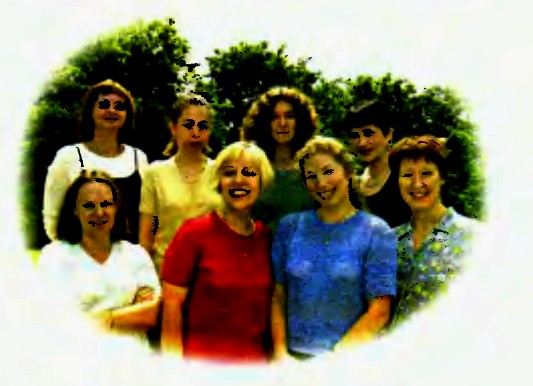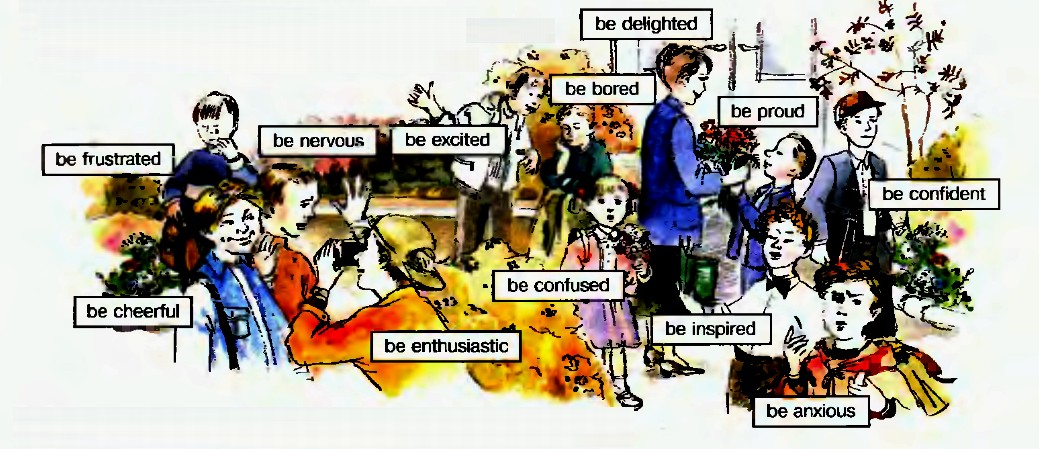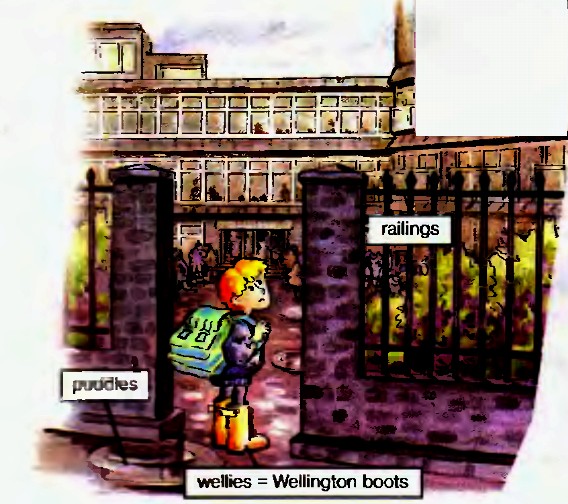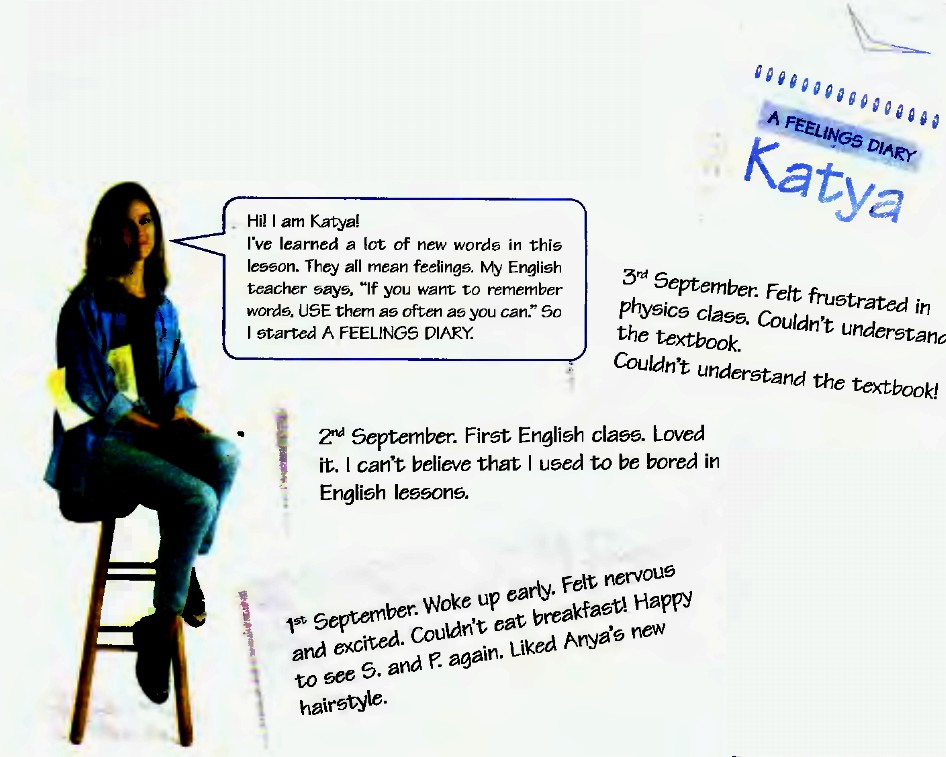|
Гипермаркет знаний>>Английский язык>>Английский язык 10 класс>> Off to school
Unit 1. A good start in life
Lessons 1-2 Off to school
Welcome back to school and welcome to your new English coursebook!
We want you to enjoy learning English this year and to have plenty of practice in listening, reading, speaking and writing.
We'd like you to start by finding your way around this book and we've devised a short quiZ to help you.
Please take afew moments to find the answers.
Good luck!
The Authors

Welcome to your new book!
1 What's the title of the book?
2 How many units are there?
3 In which unit can you find:
a) information about a famous British University?
b) a text about Bill Gates?
c) descriptions of festivals and traditions?
d) a picture of Olga Korbut?
e) a story about dinosaurs?
4 Where can you find exercises to check your progress?
5 Where can you find a list of irregular verbs?
6 What is the purpose of the word lists on pp, 173-174?
7 Where can you look up grammar rules?
8 What will you be doing in Lesson10 of each unit?
9 If you are going to do extensive reading, where can you find the texts?
10 What do the following signs mean (find them by the exercises)?

1 A. What can you do to help yourself to learn this year?
Here are some tips from us, but they've been jumbled up, Unjumble them.
a) notebook a start vocabulary new for
b) get yourseft dictionary good a
c) our use every workbook lesson after extra it you for exercises practice has
d) as as read to try can you much
e) pairwork grupwork speak or English you do when
f) unit check own progress after your every
g) well as phrases learn as words
B. Think of one more piece of advice and jumble it up.
Can other students see what your advice was?
Vocabulary
2. A. Look at the picture and say:
how people in the picture feel on the first day at school.
how you feel now you are back at school.

B. Listen to these Russian kids and guess which class they are in.
Tania _ Dmiti_ Katya_ Grigon_
C. Listen agaln and say how each speaker feels.
. There are 3 different feelings for on of the speakers.
Reading
3. А Reading and listen to the poem.
Give it a title.
GLOSSARY
invent - изобретать
swallow up - поглощать
slimy - вязкий
sewn - вышито
rough - грубый

***
A millionbillionW,lIion miles from home
Waiting for the bell to go, (To go Where?)
Why are they so big, other children?
So noisy? So much at home they
Must halle been born in uniform.
lilled all their lilies in Playgrounds,
Spent the years inllenting games
That don't let me in, Games
That are rough, that Swallow you up.
And the railings,
All around, the railings.
Are they to keep out wollles ana monsters?
Things that carry off and eat children?
Things you don't take Sweets from?
Perhaps theY're to stop us getting out.
Running away from the lessins. lessin.
Wat does a lessin look like?
Sounds small and slimy.
They keep them in glassrooms.
Whole rooms made out of glass. Imagine
I wish I could remember my name.
Mummy said it Would come in useful.
Like wellies. When there's puddles.
Yelloowwellies. I wish she Was here.
I think my name is sewn on somewhere.
Perhaps the teacher will read it for me.
Tea-cher. The one who makes the tea.
Roger McGough
B. Look through the poem again and answer these questions.
a) Can you see any unusual words in this poem?
b) Why do you think the words are like this?
c) What words do they stand for?
d) What are the feelings of the child?
e) What other evidence of the child's feelings can you see in the poem?
Language work
4. A. Remember what it was like to be so small when you were at scIJool for the first time, etc.
. How have things changed for you? Look at this sentence:

B. Make some more true sentences about how things have changed for you, using the same pattern.
Refer to your clothes, doing homework, school subjects, etc.
C. Now work in pairs and tell your partner about these changes.
Writing
5. A. Read some extracts from a diary and learn about diary style.

LANGUAGE SUPPORT
Diary
Often written in the first person.
Sometimes no pronoun.
Abbreviations.
No tenses or mostly past simple.
Wide range of adjectives (see ex. 2A for adjectives describing feelings).
B. Write your own Feelings Diary for one week.
Express your feelings about your first week at school.(See List of irreqular Verbs, p. 172.)
O. Л. Гроза, О. Б. Дворецкая, Н. Ю. Казырбаева, В. В. Клименко, М. Л. Мичурина, Н. В. Новикова, Т. Н. Рыжкова, Е. Ю. Шалимова, Английский язык нового тысячелентия, Учебник английского языка для 10 класса общеобразовательных учреждений. — 2-е изд. — М. Титул, 2004. — 175 с, ; ил.
Английский язык для 10 класса, учебники и книги по английскому языку скачать, библиотека онлайн
Содержание урока
 конспект урока конспект урока
 опорный каркас опорный каркас
 презентация урока презентация урока
 акселеративные методы акселеративные методы
 интерактивные технологии
Практика интерактивные технологии
Практика
 задачи и упражнения задачи и упражнения
 самопроверка самопроверка
 практикумы, тренинги, кейсы, квесты практикумы, тренинги, кейсы, квесты
 домашние задания домашние задания
 дискуссионные вопросы дискуссионные вопросы
 риторические вопросы от учеников
Иллюстрации риторические вопросы от учеников
Иллюстрации
 аудио-, видеоклипы и мультимедиа аудио-, видеоклипы и мультимедиа
 фотографии, картинки фотографии, картинки
 графики, таблицы, схемы графики, таблицы, схемы
 юмор, анекдоты, приколы, комиксы юмор, анекдоты, приколы, комиксы
 притчи, поговорки, кроссворды, цитаты
Дополнения притчи, поговорки, кроссворды, цитаты
Дополнения
 рефераты рефераты
 статьи статьи
 фишки для любознательных фишки для любознательных
 шпаргалки шпаргалки
 учебники основные и дополнительные учебники основные и дополнительные
 словарь терминов словарь терминов
 прочие
Совершенствование учебников и уроков прочие
Совершенствование учебников и уроков
 исправление ошибок в учебнике исправление ошибок в учебнике
 обновление фрагмента в учебнике обновление фрагмента в учебнике
 элементы новаторства на уроке элементы новаторства на уроке
 замена устаревших знаний новыми
Только для учителей замена устаревших знаний новыми
Только для учителей
 идеальные уроки идеальные уроки
 календарный план на год календарный план на год
 методические рекомендации методические рекомендации
 программы программы
 обсуждения
Интегрированные уроки обсуждения
Интегрированные уроки
Если у вас есть исправления или предложения к данному уроку, напишите нам.
Если вы хотите увидеть другие корректировки и пожелания к урокам, смотрите здесь - Образовательный форум.
|















